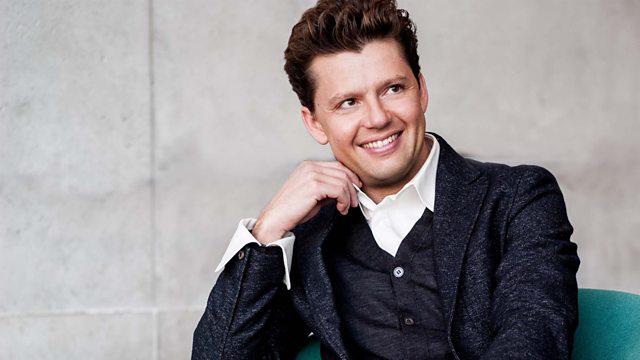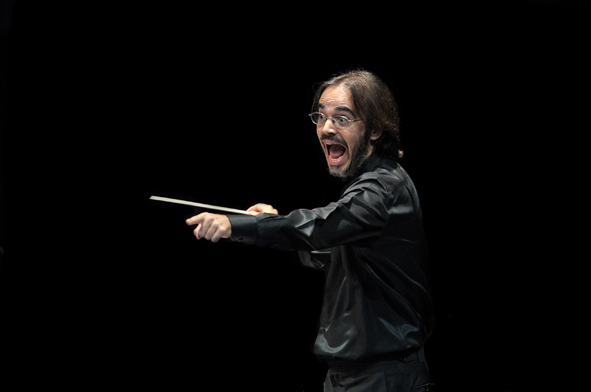Prom 42: Rachlin, BBCSSO, Volkov | reviews, news & interviews
Prom 42: Rachlin, BBCSSO, Volkov
Prom 42: Rachlin, BBCSSO, Volkov
More earth than air in second Sibelius evening, though the Fourth Symphony impresses

A second night of Sibelius symphonies at the Proms, packed to the rafters just like its predecessor. Exit Thomas Dausgaard, the tuba needed for the first two symphonies but not for the Third or – surprising given its pervasive darkness – the Fourth, and the air that had billowed around supremely supple performances.
The programme was identical to the second instalment of Rattle’s Sibelius cycle earlier this year with the Berlin Philharmonic, though it had an extra dimension in a newly-commissioned “portrait” of Sibelius, Janne, by Michael Finnissy. It began with exactly the same misconception. You can tell from the opening bars of the Third Symphony whether the conductor “gets” it or not. As with Rattle, what should be lightly-sprung repeated notes from cellos and basses, piano, were far too dour and heavy; the ideal here remains how Sakari Oramo kicked off the symphony in his very first concert with the BBC Symphony Orchestra back in 2011.
 Oramo also made sense of the enigmatic central movement, con moto but utterly hypnotic as a kind of Valse semitriste. Volkov was way too slow here, and mismanaged what should be a slightly faster tempo for the woodwind flurries, the only break in the gentle swaying; Dausgaard the night before may have had one or two co-ordination problems, and his conducting style is less elegant than Volkov's, but his faster speeds always seemed justified, to me at any rate. In the finale, the noble theme that drives us to a very assertive C major should emerge imperceptibly and proceed naturally. It was too flagged up, the song of a nation rather than that of a proud individual who’s overcome troubles.
Oramo also made sense of the enigmatic central movement, con moto but utterly hypnotic as a kind of Valse semitriste. Volkov was way too slow here, and mismanaged what should be a slightly faster tempo for the woodwind flurries, the only break in the gentle swaying; Dausgaard the night before may have had one or two co-ordination problems, and his conducting style is less elegant than Volkov's, but his faster speeds always seemed justified, to me at any rate. In the finale, the noble theme that drives us to a very assertive C major should emerge imperceptibly and proceed naturally. It was too flagged up, the song of a nation rather than that of a proud individual who’s overcome troubles.
What the real identity of the Violin Concerto was in this performance I’ve no idea. It wouldn’t have mattered that Julian Rachlin (pictured above) had a few intonation problems – the flights in the finale fox all but a handful of violinists – if there had been more give and take between soloist and orchestra. Again there's a benchmark Proms performance: Lisa Batiashvili with Oramo and the BBC Symphony Orchestra. All that remained here was the beauty of tone, the majesty of double-stopping: impressive, but still not enough. And having produced the finest orchestral sequence up to that point in the dark swell at the heart of the slow movement, Volkov killed the finale by failing to project the supporting polonaise rhythm. It’s odd that a conductor with such a firm rhythmic sense for the many new pieces he champions doesn’t like to dance. Rachlin’s encore, Ysaÿe's Third "Ballade" Sonata, didn't add up either, brilliantly executed though it was .
 Volkov (pictured left by Chris Christodoulou) seemed, at any rate, to have done a fine job on Finnissy’s character study, its name the one the Frenchified Jean was called as a child. Sibelius transformed in the opening bassoon solo and the familiar woodwind thirds soon gave way to very thick, Bergian textures; towards the end there seemed to be an interloper from the deceptively childlike world of Nielsen’s last symphony, and it carried the day, but it was leader Laurel Samuel’s eloquent, speaking violin solo that left the greatest impression. One wonders what the concerto might have been like if she’d been the soloist; we would at least have had a true dialogue with fellow players.
Volkov (pictured left by Chris Christodoulou) seemed, at any rate, to have done a fine job on Finnissy’s character study, its name the one the Frenchified Jean was called as a child. Sibelius transformed in the opening bassoon solo and the familiar woodwind thirds soon gave way to very thick, Bergian textures; towards the end there seemed to be an interloper from the deceptively childlike world of Nielsen’s last symphony, and it carried the day, but it was leader Laurel Samuel’s eloquent, speaking violin solo that left the greatest impression. One wonders what the concerto might have been like if she’d been the soloist; we would at least have had a true dialogue with fellow players.
The craggy peak of the evening had to be the austere – but, for me, not depressing – Fourth Symphony. Since Volkov’s element, like Rattle’s, seems to be earth and not air, the anchored sound was more apt in this special case among Sibelius’s orchestral works. Revelations came from the horns in all their eerie stopped music, which from where I was sitting, projected like I’ve only heard it on a handful of recordings: snarling ahead of the rest of the orchestra in the horrifying tritonal sweep which obliterates the brief merriment of the Scherzo and undermining the light of the finale throughout. Volkov sealed his credentials as a deep and serious conductor in the crucial Largo, finding the right line and undercurrents as the fragments of desolation piece themselves together into a great, brief cry from the heart and recede. But the real heroes here were the players, bowing out from the Proms as a world-class orchestra after four magnificently executed concerts.
- Listen to this Prom for the next month on the BBC iPlayer
- Listen to David Nice's BBC Radio 3 Building a Library programme on Sibelius's Fourth Symphony
- David Nice writes for theartsdesk on the Building a Library experience
Read theartsdesk's reviews of other concerts from the BBC Proms
rating
Share this article
Add comment
The future of Arts Journalism
You can stop theartsdesk.com closing!
We urgently need financing to survive. Our fundraising drive has thus far raised £49,000 but we need to reach £100,000 or we will be forced to close. Please contribute here: https://gofund.me/c3f6033d
And if you can forward this information to anyone who might assist, we’d be grateful.

Subscribe to theartsdesk.com
Thank you for continuing to read our work on theartsdesk.com. For unlimited access to every article in its entirety, including our archive of more than 15,000 pieces, we're asking for £5 per month or £40 per year. We feel it's a very good deal, and hope you do too.
To take a subscription now simply click here.
And if you're looking for that extra gift for a friend or family member, why not treat them to a theartsdesk.com gift subscription?
more Classical music
 Kohout, Spence, Braun, Manchester Camerata, Huth, RNCM, Manchester review - joy, insight, imagination and unanimity
Celebration of the past with stars of the future at the Royal Northern College
Kohout, Spence, Braun, Manchester Camerata, Huth, RNCM, Manchester review - joy, insight, imagination and unanimity
Celebration of the past with stars of the future at the Royal Northern College
 Jansen, LSO, Pappano, Barbican review - profound and bracing emotional workouts
Great soloist, conductor and orchestra take Britten and Shostakovich to the edge
Jansen, LSO, Pappano, Barbican review - profound and bracing emotional workouts
Great soloist, conductor and orchestra take Britten and Shostakovich to the edge
 Jakub Hrůša and Friends in Concert, Royal Opera review - fleshcreep in two uneven halves
Bartók kept short, and a sprawling Dvořák choral ballad done as well as it could be
Jakub Hrůša and Friends in Concert, Royal Opera review - fleshcreep in two uneven halves
Bartók kept short, and a sprawling Dvořák choral ballad done as well as it could be
 Hadelich, BBC Philharmonic, Storgårds, Bridgewater Hall, Manchester review - youth, fate and pain
Prokofiev in the hands of a fine violinist has surely never sounded better
Hadelich, BBC Philharmonic, Storgårds, Bridgewater Hall, Manchester review - youth, fate and pain
Prokofiev in the hands of a fine violinist has surely never sounded better
 Monteverdi Choir, ORR, Heras-Casado, St Martin-in-the-Fields review - flames of joy and sorrow
First-rate soloists, choir and orchestra unite in a blazing Mozart Requiem
Monteverdi Choir, ORR, Heras-Casado, St Martin-in-the-Fields review - flames of joy and sorrow
First-rate soloists, choir and orchestra unite in a blazing Mozart Requiem
 Cho, LSO, Pappano, Barbican review - finely-focused stormy weather
Chameleonic Seong-Jin Cho is a match for the fine-tuning of the LSO’s Chief Conductor
Cho, LSO, Pappano, Barbican review - finely-focused stormy weather
Chameleonic Seong-Jin Cho is a match for the fine-tuning of the LSO’s Chief Conductor
 Classical CDs: Shrouds, silhouettes and superstition
Cello concertos, choral collections and a stunning tribute to a contemporary giant
Classical CDs: Shrouds, silhouettes and superstition
Cello concertos, choral collections and a stunning tribute to a contemporary giant
 Appl, Levickis, Wigmore Hall review - fun to the fore in cabaret and show songs
A relaxed evening of light-hearted fare, with the accordion offering unusual colours
Appl, Levickis, Wigmore Hall review - fun to the fore in cabaret and show songs
A relaxed evening of light-hearted fare, with the accordion offering unusual colours
 Lammermuir Festival 2025, Part 2 review - from the soaringly sublime to the zoologically ridiculous
Bigger than ever, and the quality remains astonishingly high
Lammermuir Festival 2025, Part 2 review - from the soaringly sublime to the zoologically ridiculous
Bigger than ever, and the quality remains astonishingly high
 BBC Proms: Ehnes, Sinfonia of London, Wilson review - aspects of love
Sensuous Ravel, and bittersweet Bernstein, on an amorous evening
BBC Proms: Ehnes, Sinfonia of London, Wilson review - aspects of love
Sensuous Ravel, and bittersweet Bernstein, on an amorous evening
 Presteigne Festival 2025 review - new music is centre stage in the Welsh Marches
Music by 30 living composers, with Eleanor Alberga topping the bill
Presteigne Festival 2025 review - new music is centre stage in the Welsh Marches
Music by 30 living composers, with Eleanor Alberga topping the bill
 Lammermuir Festival 2025 review - music with soul from the heart of East Lothian
Baroque splendour, and chamber-ensemble drama, amid history-haunted lands
Lammermuir Festival 2025 review - music with soul from the heart of East Lothian
Baroque splendour, and chamber-ensemble drama, amid history-haunted lands

Comments
A second night of Sibelius
You're in for a
You're in for a disappointment when you read David Benedict's review, Sibbe. Personally I liked it more on the radio and thought Helen Vollam's trombone solo in the Seventh was the best I've ever heard, but I usually share his reservations about Vanska's missing the flow. And I hold fast to my highlight, Dausgaard's revelatory (to me) performance of the First. Stephen Johnson shares my enthusiasm.